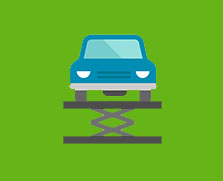What has caused my Volkswagen Polo's cam belt and tensioner to fail after just three years?
I have a 1997 Polo 16v 100bhp (the one with the ridiculously low gearing). I love it and, since I’ve owned it, Volkswagen has serviced it once a year. In June/July 2008, as per schedule, the cambelt and tensioner were changed by the dealer. The recommended interval is four years or 40,000 miles. This month I started the car one morning and it sounded like a bag of bolts, so I called out the RAC and the Polo got towed up the road to the nearest garage. The cause was the tensioner-rollers having disintegrated and effectively melted. I’m not entirely sure how but I have the parts (and photos). The water pump was and is fine, as is everything else with the car.
The garage assumed (didn’t get) my instructions and went on to fit a new cambelt and tensioner; a Volkswagen genuine part (from a manufacturer-owned supplier) priced at £124, with labour charges of£60 including VAT (total £184). I was expecting the parts to last longer than three years, considering they’re supposed to last four years. The Volkswagen dealer seems to think I’m making it all up. Do you know any half-decent Volkswagen garages around the Surrey/Sussex area that will tell me the truth?
Take it to Wheelbase of Hersham, Surrey. I'll tell you exactly what happened. The garage that replaced the timing belt did not replace the plastic/nylon rollers. This was plain idiotic, because the only reason for VAG issuing the edict that timing belts were to be changed at 40,000 miles or four years was because of failures of these plastic/nylon rollers on 1.4 and 1.6 16v engines. The belt itself never fails. The rollers do. They are what needs to be replaced.
Previously VAG engines had iron or steel timing belt rollers. When the bearings of these rollers started to fail they would first heat up, then start to shriek, giving ample warning they needed to be changed. However, when the bearing in a plastic/nylon roller heats up, it melts or cracks the roller and flings off the belt before it starts to shriek. Opel/Vauxhall let itself into precisely the same problem in the 1990s, so you would think that the German engineers at Volkswagen knew about it before they too started fitting plastic rollers. (They probably did, and got overruled by the accountants.)
Previously VAG engines had iron or steel timing belt rollers. When the bearings of these rollers started to fail they would first heat up, then start to shriek, giving ample warning they needed to be changed. However, when the bearing in a plastic/nylon roller heats up, it melts or cracks the roller and flings off the belt before it starts to shriek. Opel/Vauxhall let itself into precisely the same problem in the 1990s, so you would think that the German engineers at Volkswagen knew about it before they too started fitting plastic rollers. (They probably did, and got overruled by the accountants.)
Answered by Honest John on




